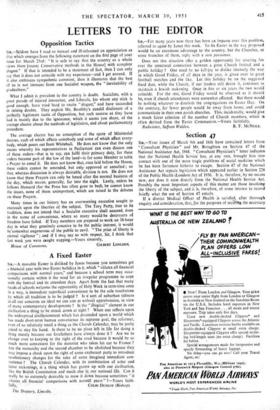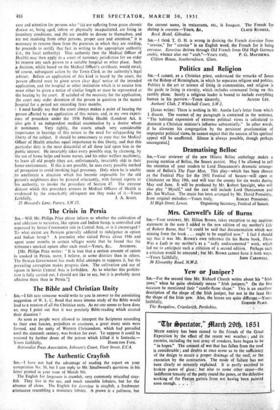Section 47 SIR,—Your issues of March 9th and 16th have
contained letters from "Consultant Physician" and Mr. Broughton on Section 47 of the National Assistance Act, 1948. "Consultant Physician's" letter indicates that the National Health Service has, at any rate, brought him into contact with one of the more tragic problems of social medicine which he has been fortunate hitherto to escape. Section 47 of the National Assistance Act repeats legislation which appeared earlier in Section 224 of the Public Health (London) Act of 1936. It is. therefore, by no means new, nor does it stem directly from the National Health Service Act. Possibly the most important aspects of this matter are those involving the liberty of the subject, and it is, therefore, of some interest to record briefly what the use of Section 47 entails.
If a district Medical Officer of Health is satisfied, after thorough enquiry and consideration, that,,for the purposes of staffers the necessary
care and attention for persons who "(a) are suffering from grave chronic disease or, being aged, infirm or physically incapacitated, are living in insanitary conditions, and (b) are unable to devote to themselves, and tare not receiving from other persons, proper care and attention," it is necessary to remove them from the premises in which they are residing, he proceeds to certify that fact in writing to the appropriate authority (i.e., the local authority). That authority (not the Medical Officer of Health) may then apply to a court of summary jurisdiction for an order to 'remove any such person to a suitable hospital or other place. Such ss decision, whilst based on the Medical Officer's certificate, would entail, $of course, subsequent action by the Town Clerk as the authority's legal adviser. Before an application of this kind is heard by the court, the person affected must be given seven clear days' notice of the intended application, and the hospital or other institution which is to receive him must either be given a notice of similar length or must be represented at the hearing by the court. If satisfied of the necessity for the application, the court may order detention of the person in question in the named hospital for a period not exceeding three months.
■ • I need hardly say that the court always makes a point of hearing the person affected by an application of this nature, and, in my own experi- enc: of procedure under the 1936 Public Health (London) Act, it also gets it an independent medical examination by a doctor whom it nominates. Very rightly, the courts attach very considerable importance in hearings of this nature to the need for safeguarding the liberty of the subject. It should be unnecessary to state that the Medical Officer of Health attaches equal importance to this liberty, and that this particular duty is the most distasteful of all those laid upon him in the public interest. He invariably takes every possible step, by cleansing, by the use of home helps and home nurses, and his other welfare machinery, to leave all old people (they are, unfortunately, invariably old) in their home environment. If this is not possible, he uses every possible method of persuasion to avoid invoking legal processes. Only when he is unable ;to ameliorate a situation which has become impossible for the old Person's neighbours does he proceed reluctantly, with formal reports to his authority, to invoke the procedure of Section 47. The extreme distaste which this procedure arouses in Medical Officers of Health is 'evidenced by the remarkably infrequent use they make of it.—Yours faithfully, J. A. Scorn 25 Howard's Lane, Putney, S.W.l5. •































 Previous page
Previous page